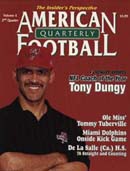Article CategoriesAFM Magazine
|
1997 AFM Coordinators of the Year© More from this issueOffense What a difference a year makes when shaping the identity of a program. Take, for example, the Bruins of UCLA and offensive coordinator Al Borges, who recently participated in year two of Bob Toledo's tenure. From the moans and groans of an inaugural 5-6 campaign came the hope for progress in 1997. A young, learning quarterback. Five starters on the offensive line. Experience on both sides of the ball. "We wanted to improve. Starting out 0-2 scared us a little bit, but I knew we were getting better," Borges said. UCLA did start out 0-2. But they reeled off a school-record 10 straight wins (done before in 1946) and immediately gave Toledo's program more than legitimacy in Bruin annals, capping the year with a come-from-behind Cotton Bowl victory against Tex....The full article can only be seen by subscribers.
|
|
|||||||
| HOME |
MAGAZINE |
SUBSCRIBE | ONLINE COLUMNISTS | COACHING VIDEOS |
Copyright 2025, AmericanFootballMonthly.com
All Rights Reserved





